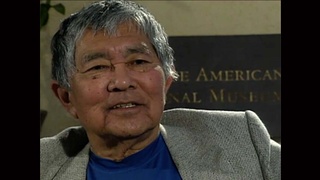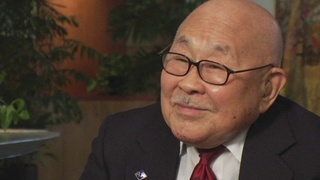Interviews
Not fully understanding parents' World War II incarceration while growing up
I remember we always were aware of the shadow of the camps in the back, that they had gone somewhere sometime and were taken away by the government. But we were young at that time and our lives revolved around sports and school and so it wasn't—and theirs was about making a living and surviving. So there was no need to discuss that—or not, not a need, people didn't discuss it. I learned about it, some parts of it from them, I learned parts of it in school, there were a couple of paragraphs in history books and that's about all there was in high school. And in college I learned a little bit more about it.
And it went, I guess when I really started questioning it was when the Civil Rights movement started going in full bloom and there were demonstrations in the South and that carried over to more demonstrations, calls for sit-ins and equality. And that gave rise to the real, to the notion of ethnic identity. And in 1967, groups of Asian Americans—and led mostly by Japanese Americans, because they were more Americanized at the time, and mostly at UCLA—started discussing the issue of the camps and identity. And I remember bringing that up to my folks and they would give me bits and pieces of information but they really didn't want to talk about it.
Date: February 8, 2003
Location: Washington, US
Interviewer: Tom Ikeda, Margaret Chon
Contributed by: Denshō: The Japanese American Legacy Project.
Explore More Videos

Camouflage Net Weaving in Manzanar
Japanese American animator for Walt Disney and Hanna Barbera (1925-2007)

Developing Art Skills in Camp
Japanese American animator for Walt Disney and Hanna Barbera (1925-2007)

Return to Los Angeles
Japanese American animator for Walt Disney and Hanna Barbera (1925-2007)

Grandfather's interrogations during World War II
(b. 1952) Former banking executive, born in Hawaii

Grandparents were incarcerated in Jerome, Arkansas
(b. 1952) Former banking executive, born in Hawaii


Grandfather helping administration in camp
(b. 1952) Former banking executive, born in Hawaii

Leaving Topaz
(1914–2015) Nisei YMCA and Japanese American community leader

Leaving a camp to attend college
(1914–2015) Nisei YMCA and Japanese American community leader

Keeping Japanese Performance Arts Alive in the Camps
(b. 1932) Nisei American stage, film, and TV actress

The Emotional Toll of Being Incarcerated in Camp during World War II
(b. 1932) Nisei American stage, film, and TV actress

Sister’s Trauma from being Incarcerated during World War II
(b. 1932) Nisei American stage, film, and TV actress


Loss of happy-go-lucky adolescence in Puyallup Assembly Center
(b. 1923) Nisei from Washington. Resisted draft during WWII.

Didn't have rights that whites had
(1922–2014) Political and civil rights activist.
